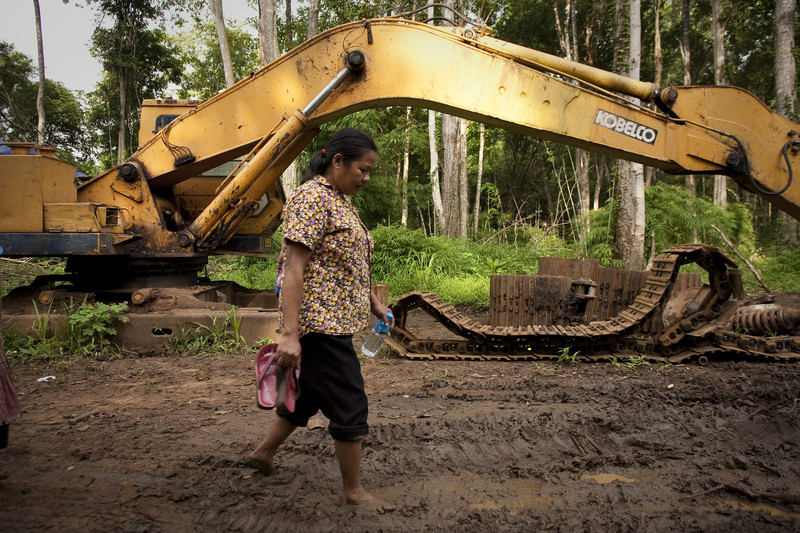Challenging us to think big at Oxfam on gender and extractive industries
 Near the community of Ka Chok, villagers are concerned about a mining concession granted to a Vietnamese company. Local farmers were not consulted about the concession and worry that they will not have access to farm lands in the forest. September 2010. (Photo: Patrick Brown/ Oxfam America)
Near the community of Ka Chok, villagers are concerned about a mining concession granted to a Vietnamese company. Local farmers were not consulted about the concession and worry that they will not have access to farm lands in the forest. September 2010. (Photo: Patrick Brown/ Oxfam America)
Achieving gender equality in extractive industries – or any other sector – is a goal in itself, not just a means to others.
Ian Thomson is a Policy Specialist for Extractive Industries at Oxfam Canada.
Last March, I attended a unique dialogue session in which Oxfam brought together staff from five continents, women’s rights partners, and representatives from government, industry and financial institutions for a strategic dialogue on gender justice in the extractive sector.
It was fitting that we were gathering at Whittemore House, a historic house in downtown Washington with a mandate to advance women’s political participation. After all, the struggles for gender justice and corporate accountability are inherently political struggles.
This was my first meeting as a member of Oxfam’s Extractive Industries Global Program. Having been hired by Oxfam only two weeks earlier, I was eager to meet my new colleagues and partners.
Women’s rights activists, academics, funders, Oxfam staff, World Bank officials, even a mining company representative – there were many voices in the room. Over the course of the day, I was impressed by how people from such different backgrounds and perspectives were able to exchange views and question one another. As they exchanged ideas and discussed solutions, they touched on many of the issues and thorny problems that are reflected in Oxfam’s newly published Position Paper on Gender Justice and the Extractive Industries.
Some panels operated at a conceptual level, challenging everyone in the room to rethink terms like “social accountability” from a feminist perspective and consider the feminization of responsibility.
At other points in the day, we heard directly from participatory action researchers who collected firsthand testimony of women who were impacted by extractive industries: women mine workers who were raped or even killed while on the job; peasant women who faced violent repression for daring to stand-up to a multinational mining company moving into their territory; and Indigenous women documenting the negative social impacts of industrial mining on their small community in the high Arctic.
The testimonies and lessons from this on-the-ground research grounded the conversation on where Oxfam should be influencing this industry and how to support women and men working at the grassroots.
I was struck by a word of caution from one participant who said that women’s struggles should not simply be instrumentalized to achieve other ends. Although there is a clear business case for greater gender equality in the extractive industries, women’s empowerment is not simply an ingredient that should be added to improve the outcomes of natural resource extraction projects. Women’s concerns and aspirations must be at the center of our struggles for justice. This may involve flipping our questions on their heads. For instance, the question: “How does women’s participation lead to more equitable tax policy?” may need to be reframed into “How can more equitable tax policy help eliminate gender injustice and increase women’s agency over their own lives and livelihoods?”
The upshot of the dialogue was that there is no one-size-fits-all solution. Changing an entrenched culture of patriarchy in the extractive industries will not be achieved solely with a top-down or bottom-up approach. As Oxfam, we need to keep working at the grassroots, amplifying the voices of women in their homes, their communities, their workplaces – to support them and others in winning respect for women’s rights locally and for equal participation in decision-making on natural resource extraction. We can also help pave the way for women from extractives-affected communities to sit at national and international policy-making tables.
Our progress will be measured by the extent to which natural resource extraction occurs in a manner that respects women’s rights and responds to the priorities and aspirations of both women and men.
As one speaker said on the opening panel, these struggles are inherently political. I left the dialogue with a sense that transformative change is possible, but we need to be in it for the long haul. Gender justice is more than a policy “ask”; it is a direct challenge to the powers that be.
—
To read about the strategic dialogue Gender Justice and the Extractive Industries: Setting the Change Agenda and to view the event report, click here.